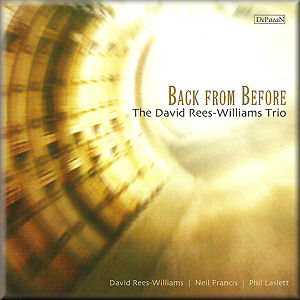1. Organ Symphony No. 6, Movement 1 (Widor)
2. Wash Me Throughly (S. S. Wesley)
3. The Queenes Command/Preludium (O. Gibbons)
4. Stabat Mater/Se tu n'ami (Pergolesi)
5. Gavotte (S. Wesley)
6. Prelude in C Major/Partita No 2 in C minor (J. S. Bach)
7. Symphony No. 4, Movement 2, Adagio (Tchaikovsky)
8. Gigue in G, K.574 (Mozart)
9. Das alte Jahr vergangen ist (J. S. Bach)
10. Ave Verum Corpus (Mozart)
11. Lead Me Lord (S. S. Wesley)
12. Laudate Dominum (Parry)
David Rees-Williams - Piano, Hammond organ, vibraphone, keyboard
Phil Laslett - Drums
Neil Francis - Bass guitar
Stephanie Oade - Cello
Alexander Van Ingen - Percussion
As I said in a previous review of a David Rees-Williams CD,
David follows a long tradition of "jazzing the classics". Except that David's trio doesn't so much jazz up classical pieces as present them in new guises with a jazz influence. David doesn't "send up" classical pieces, for which he obviously has great respect: instead he savours their melodic and harmonic virtues while adding the ambience of the jazz piano trio. He uses overdubbing to add extra sounds from the Hammond organ, electronic keyboards and vibes, which sometimes tends to clutter the sound. Yet his transformations of classical compositions are almost invariably fascinating.
David's predilection for church music is reflected in the repertoire. I am particularly glad to find his inclusion of S. S. Wesley's Wash Me Throughly, which I used to sing in a church choir. Rees-Williams brings out its captivating melody, with a hint of waltz rhythm. The melodic appeal is also strong in Wesley's Lead Me Lord and his relative's playful Gavotte, where David states the theme on vibes against a Latin-American background which then alternates between a jazz waltz and an up-tempo four-four. Orlando Gibbons's danceable galliard is also in waltz time, followed by a mercurial prelude.
The first movement of Widor's 6th Organ Symphony captures that composer's thrilling, almost bombastic style, with piano overdubbing organ. The drummer accentuates the more forceful passages, although bass and drums are largely in the background throughout this album. A cello is added for two slow pieces by Pergolesi. A similar meditative mood is present in the pieces by Bach, although track 6 hots up with a bustling fugue towards the end.
The Adagio from Tchaikovsky's 4th Symphony is probably the best-known piece here, and David brings out its gentle poignancy. Mozart' Gigue in G has a decidedly bluesy - almost funky - feeling, which the trio makes the most of. The same composer's Ave Verum Corpus is a very different matter, although its solemnity is lightened by the Latin rhythms suggested by the drums.
The album ends with Parry's familiar hymn tune, Laudate Dominum, otherwise known as O Praise Ye the Lord, where David combines piano, organ and vibes to create a rich tapestry of sound. You can compare Rees-Williams with Jacques Loussier but I think he is more adventurous, using classical pieces as the starting-point for free-ranging improvisation.
Tony Augarde
